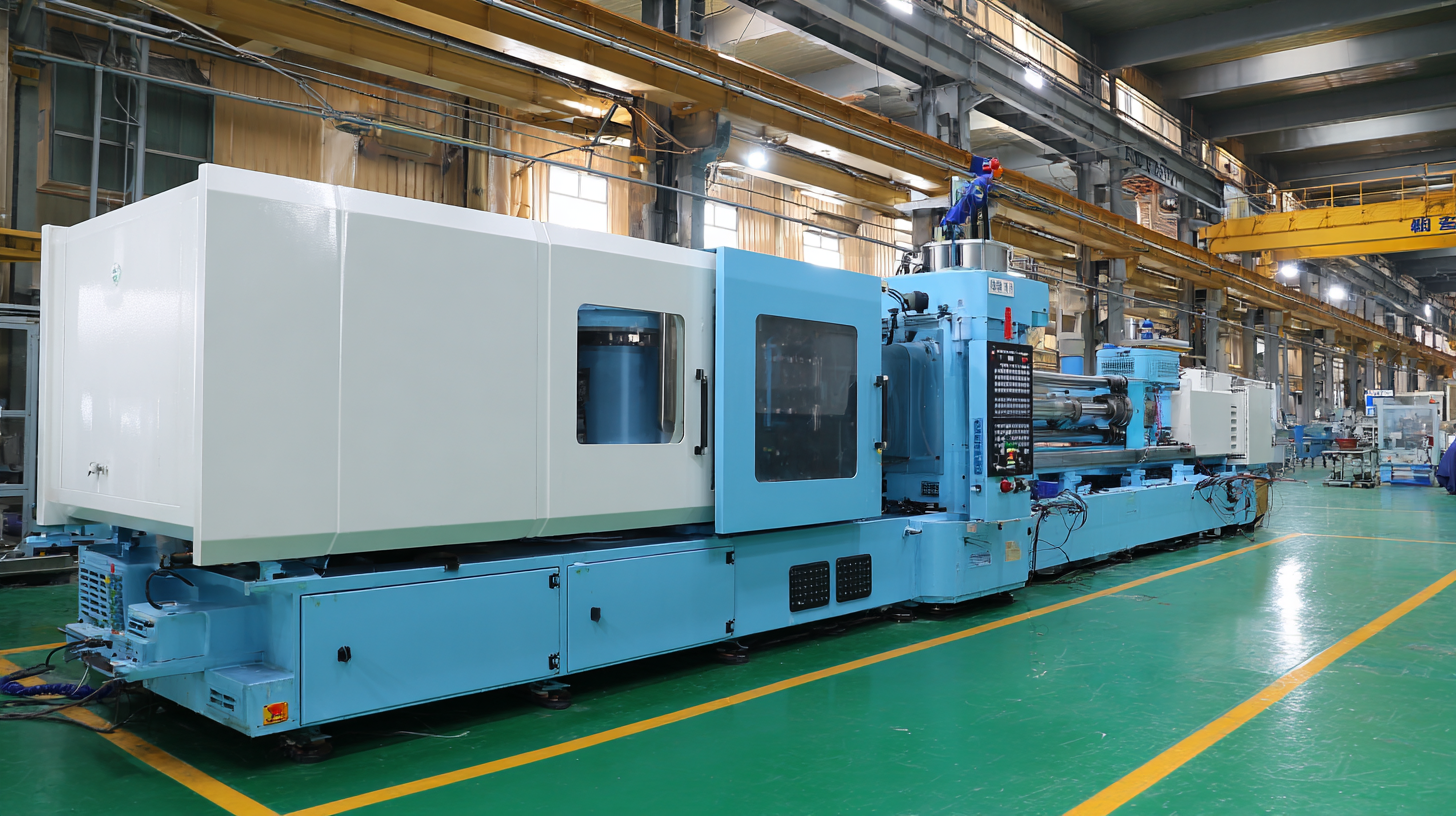How to Navigate Import and Export Certifications for Best Mold Plastic Injection Products
Navigating the complexities of import and export certifications is crucial for businesses focusing on mold plastic injection products. As global trade continues to expand, ensuring compliance with various regulatory requirements can be daunting yet essential for success. In this blog, we will explore the importance of obtaining the right certifications for mold plastic injection and how these credentials can impact product quality, safety, and marketability.

From understanding the certifications needed for both domestic and international markets to practical steps on how to secure them, we aim to provide valuable insights that will streamline the certification process. Whether you're a manufacturer, supplier, or exporter, this guide will equip you with the knowledge needed to effectively navigate the certification landscape and enhance your business's competitive edge in the world of mold plastic injection.
Understanding Import and Export Certifications in the Mold Plastic Injection Industry
Navigating the complex landscape of import and export certifications is crucial for businesses involved in the mold plastic injection industry. These certifications not only ensure compliance with international trade regulations but also enhance product credibility in global markets. Understanding the specific requirements for each region is vital. For instance, certifications such as ISO standards or CE marking can significantly affect a product's marketability in Europe and other regions, while compliance with FDA requirements is essential for markets in the United States.
Furthermore, staying updated on changes in regulations and emerging markets is crucial for competitive advantage. Companies should invest in training and resources to understand these certifications fully and incorporate them into their production and export strategies. Collaborating with experienced customs brokers or industry experts can further simplify the certification process, ensuring that all necessary documentation is in order. Ultimately, a strong grasp of import and export certifications will not only facilitate smoother operations but also boost the reputation of businesses within the mold plastic injection sector.
Import and Export Certifications in the Mold Plastic Injection Industry
This chart illustrates the distribution of different types of import and export certifications that mold plastic injection products typically require in various regions. Understanding these certifications is crucial for manufacturers and exporters to ensure compliance and market access.
Key Certifications Required for High-Quality Mold Plastic Injection Products
When engaging in the import and export of mold plastic injection products, understanding the key certifications required for compliance is crucial. Certifications such as ISO 9001, which emphasizes quality management systems, are vital for ensuring that products meet international standards. Additionally, obtaining CE marking is essential for European markets, assuring that products adhere to health and safety regulations.
Tips: Always consult with a compliance expert to identify specific certification requirements tailored to your target market. This can save time and resources while ensuring your products are market-ready.
Another important certification to consider is RoHS, which restricts hazardous substances in electrical and electronic equipment. This is particularly vital if your mold products are used in these sectors. Securing these certifications not only enhances your product's credibility but also significantly broadens your market reach.
Tips: Regularly update your knowledge on changing regulations in your target regions to remain compliant. Consider establishing a relationship with a certified institution to facilitate a smoother certification process.
How to Navigate Import and Export Certifications for Best Mold Plastic Injection Products
| Certification | Issuing Body | Purpose | Importance in Trade |
|---|---|---|---|
| ISO 9001 | International Organization for Standardization | Quality Management Systems | Enhances product quality and boosts customer confidence |
| CE Marking | European Union | Product Safety and Compliance | Mandatory for selling in Europe; ensures safety standards |
| RoHS Directive | European Union | Restriction of Hazardous Substances | Ensures products are free from harmful materials |
| UL Certification | Underwriters Laboratories | Product Safety Testing | Aids market acceptance in North America; safety assurance |
| FDA Approval | U.S. Food and Drug Administration | Food and Medical Product Safety | Essential for materials in contact with food and medical devices |
Navigating Regulatory Compliance for Importing and Exporting Mold Products
Navigating regulatory compliance for importing and exporting mold products is crucial for businesses looking to thrive in the global market. Different countries have unique standards and certifications that manufacturers must meet to ensure their products are safe, accessible, and legally permissible. For instance, understanding the FDA regulations in the United States or the CE marking requirements in Europe can determine the success of a product's entry into these lucrative markets. A thorough knowledge of local regulations not only streamlines the import process but also helps avoid costly fines and product recalls.

Furthermore, companies should invest in building relationships with experienced customs brokers and regulatory consultants who can provide insight into the specific compliance requirements of each market. These professionals can assist in navigating intricate documentation, testing protocols, and quality assurance measures necessary for mold plastic injection products. Staying updated on changing regulations and industry standards is essential, as non-compliance can result in delays or bans on product shipments, significantly impacting market competitiveness and profitability. By prioritizing regulatory compliance, businesses can ensure smoother import and export processes, thereby enhancing their international presence.
Impact of Certifications on Market Access and Trade Opportunities
When discussing the impact of certifications on market access and trade opportunities for mold plastic injection products, it's essential to recognize the significant role that compliance with industry standards plays. According to a report by the Plastics Industry Association, around 80% of manufacturers experienced a boost in their international market access after obtaining certifications such as ISO 9001 and ISO 14001. These certifications not only enhance product quality and safety but also provide a competitive edge in a crowded marketplace.
Moreover, certifications can open doors to lucrative trade opportunities. A study conducted by Mordor Intelligence found that the global mold plastic injection market is anticipated to grow at a CAGR of 4.6% from 2021 to 2026. Companies that prioritize obtaining relevant certifications are better positioned to leverage this growth. Various countries have stringent regulations regarding product imports, and having recognized certifications simplifies the regulatory approval process, thus reducing time-to-market for new products. As a result, manufacturers can expand their reach and establish partnerships in emerging markets, ultimately driving profitability and sustainability in their operations.
Future Trends in Certification Processes for Mold Plastic Injection Manufacturers
The landscape of certification processes for mold plastic injection manufacturers is undergoing significant transformations, driven by advancements in technology and evolving regulatory requirements. According to a recent report by MarketsandMarkets, the global injection molding market is anticipated to reach $329.58 billion by 2027, growing at a compound annual growth rate (CAGR) of 5.1%. This growth necessitates a re-evaluation of certification processes to ensure product safety and compliance with international standards.

As manufacturers strive to maintain a competitive edge, many are adopting automated systems for certification tracking and compliance management. The integration of artificial intelligence and machine learning into these processes not only streamlines operations but also enhances accuracy in documentation. A study by Deloitte highlights that 70% of companies leveraging advanced digital solutions in compliance reporting have seen a significant reduction in time spent on certification processes. Furthermore, as environmental concerns gain traction, manufacturers are increasingly being required to adhere to sustainability certifications, which could reshape the future dynamics of product development and marketability in the mold plastic injection sector.

